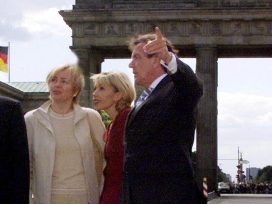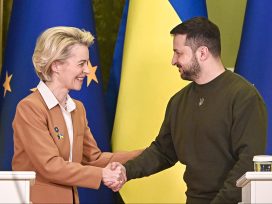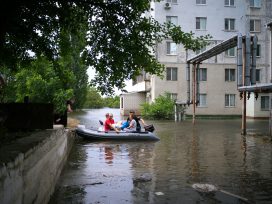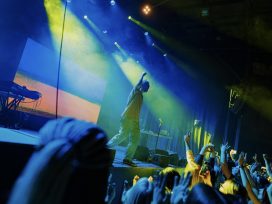We often talk about there being “two Ukraines”, about how compatible or incompatible they are, how love draws them together and mutual distrust drives them apart.
However, we rarely notice that Europe also has two faces. They look in different directions and only occasionally see each other.
There is the Europe that presents a more or less emotionless face of rules and regulations. This Europe ends somewhere along the frontier between Germany and Poland. A kind of Euro-protestantism prevails: it has lost faith in European civilization but preserved its sense of morality. The European idea has been transformed into a set of rules and a collection of institutional procedures. Where there is no faith, rules become paramount.
The other Europe is spontaneous and emotional, the Europe of faith. This is Young Europe, comprising in the main the countries of the former socialist bloc. For the people living in these countries, Europe is still a vision, an ideal, utopia. They believe in Europe but often ignore its rules. For them Europe is a kind of mystical ecstasy in which they can forget about legal codes. In the face of Euro-catholicism and Euro-orthodoxy, they are filled with faith and ready to die for Europe, but not always ready to live for it. For them rules are too trivial for them to be concerned with.
Us Ukranians, we are that other Europe.
All that remains of the faith that western Europeans – the Euro-protestants – once had in the absolute value of Europe is a set of rules and regulations, and so they find it hard to understand us. They cannot grasp the significance of our European flags waving in the midst of tales from Ukraine’s days of glory, the fires of revolution and nationalist slogans.
They do understand a great deal about our protests, but they still cannot comprehend what is most important about them: for us Europe is emotion, not rules. It is a far-off ideal, in which we have faith. Europe is a deity with whom we wish to unite, not the set of rules that an absent deity’s high priest would have us live by.
Europe is also a light at the end of a tunnel. When do you need a light like that? Only when it’s pitch black all around. Why else have the protesters made a symbol out of the simple act of switching on the torch in their mobile telephones in the middle of the night? Because each torch is a little light at the end of a little tunnel.
*
There is a paradox at the heart of the Ukrainian rebellion. It is an ideal milieu for society as a whole to live and grow in just the same way as a living organism lives and grows. But outside of the actual rebellion, there is virtually no such thing as society: there are only individuals and tribes – a “war of every man against his neighbour”, in which no one trusts anyone else. People are divided into families, clans and groups, not only “there”, “on the top of the heap”, but also “here”, “at the bottom”.
However, human beings are creatures who can conceive of something greater than small communities. People feel stifled in small communities, and just a small amount of solidarity often proves insufficient. There are times when people yearn for the universal brotherhood of humankind. It is this utopian brotherhood that is the ideal society.
All the Kremlin propaganda about “revolutions funded from abroad” is wrong, not only at a practical level, but also at a personal level. People in Ukraine are not coming out on to the streets in the hope of getting something; they do so in order to give. They freely give of their time, their comfort, their food, their possessions, their money, their joys, hopes and sorrows. In short, their daily bread. And they are not looking for anything in return.
We are no longer dealing with “colour revolutions”. We are dealing with revolutions in which people make a gift of themselves.
*
Something very interesting emerges from the “counterrevolutionary” commentaries that see western puppet masters controlling current events in Ukraine: these commentaries fit very neatly into the pattern of counterrevolutionary thought over the past two hundred years.
Counterrevolutionary thinking is for the most part monarchical and hierarchical; it strives to defend a precisely defined system with a ruler at the top and a hierarchical structure below. It is here that the greatest mistake is made. Out of sheer inertia such thinking, when defending the existing system and its hierarchy, presupposes that the enemy has an equivalent system and hierarchy, that it is a well-ordered hierarchical world conspiracy. One thinks of Freemasons, Templars, Jacobins, Jacobites, Germans, Zionists, Americans. For instance, Putin’s enemy is seen as a kind of anti-Putin, his alter ego.
It is beyond the power of people who think in this way to realize that revolutionary, and even evolutionary, processes in society are neither hierarchical nor systematic. They cannot see that monarchists are opposed by an elemental force rather than by a hierarchy, and that the logic of this elemental force is quite unlike that of any system. This logic may not always be angelic in nature, and it does not always lead to positive results (quite the contrary – the results are very often negative). But it is most certainly different. At the very least this kind of logic has more than one centre, one brain and one heart.
*
But we should get back to Europe.
Throughout the twentieth century, the geographical outline of Europe changed every twenty or thirty years. “Formally”, Europe continued to exist within certain institutional boundaries. Beyond those boundaries, however, a new kind of spontaneous reality was beginning to take shape, one that would place the very existence of those boundaries in doubt. Europe as an “institution” and as an “idea” moves at different speeds: it took several decades for the expansion of the idea of Europe to bring about the expansion of the Europe of institutions. Europe as idea always moves ahead faster than Europe as institutional reality.
The “two Europes” – the Europe of rules and the Europe of faith, the Europe of institutions and the Europe of ideas – have always existed, albeit more in the form of Weberian “ideal types” with countless exceptions that merely prove the rule. And the boundary between the two was constantly shifting.
There were at least three waves of expansion of the European idea in the twentieth century, each of which led to the expansion of Europe as an institution.
The first wave began in Germany and Italy. It is hard to believe nowadays that, after the First World War, the question of whether or not Germany was the “West” was the focus of intense discussion in the country. For Europe at the time, the “West” meant France and Great Britain – rational, pragmatic, secular, parliamentary societies. Germany was to follow its own Sonderweg, its own special road.
After the Nazi Sonderweg ended in tragedy for the whole of Europe, it is truly surprising that the founding fathers of the new anti-Nazi Europe were German-speaking politicians: Robert Schuman, a Frenchman from Alsace, Konrad Adenauer, a German from Cologne, and the Italian prime minister Alcide de Gasperi, born in Tyrol (when it was still part of Austria-Hungary).
After the war, West Germany gradually became part of the new European project, at first as a hostage of the European Community, set up in the 1950s with the specific intention of rendering impossible any kind of restoration of the German military-industrial complex. There is often an irony to the way in which history unfolds: an organization that was supposed to keep Germany tied down turned it within a few decades into the leading power on the European continent. Germany today, and especially after reunification, is the force that drives the European project forward. It is the engine and brain of Europe, although not its heart.
The example of Italy is somewhat similar. At the end of the 1910s and the beginning of the 1920s there were discussions on the special road ahead for the country that were no less heated than those in Germany. Many Italians, including Mussolini himself, read Oswald Spengler’s Decline of the West and applauded his views. Even before the birth of fascism, Enrico Corradini’s idea of Italy as an essentially “proletarian nation” standing in opposition to the “bourgeois” nations of Britain, France and Germany, was gaining enormously in popularity. Here again, after the war all the talk of Italy’s special road ahead ceased: the country became one of the founding members of the six-nation “European Community”, the forerunner of the European Union we have today.
In the 1950s and 1960s, the nations that had been seeking a “special road” in contrast to the “liberal” and “parliamentary” countries came to be at the very centre of a new liberal political project. This first wave of expansion of the European idea came to an end when Great Britain, Ireland and Denmark joined the European Community in 1973. The second, Mediterranean, wave began almost immediately.
*
This second wave gathered strength after the death of Salazar in 1970 and Franco in 1975, and the downfall of the Greek military junta in 1974 following the tragicomic events in Cyprus.
This second wave of expansion had a unique feature: all three countries – Portugal, Spain and Greece – had been ruled by right-wing or ultra-right regimes, and the shift in favour of Europe was at first directed by forces that could hardly be suspected of harbouring pro-European sympathies. Franco had viewed King Juan Carlos as his successor when he appointed himself “Regent” of the re-established monarchy in 1947, yet the King became the symbol of changes and democratic reforms in Spain. The military junta that de facto instigated the coup d’etat in Portugal in 1974 opened the way to democratization, and voluntarily transferred power to the democratically elected socialist government of Mario Soares. In Greece, pro-European reforms began with the return of Konstantinos Karamanlis, conservative prime minister in the 1950s and 1960s.
These processes all demonstrate the extent to which the societies of these three countries had changed. Even conservative political forces or military interference which at other times would have guaranteed authoritarian rule could not stem the tide of democratization “from below”, the processes that de Tocqueville termed “democracy as a social condition”. Former dictators and their successors had to reconcile themselves to the changes in society.
This second wave – the Mediterranean expansion of the “European Community” – reached its peak when Greece joined in 1981, followed by Spain and Portugal five years later. As with the first wave, the formal expansion of Europe marked the end of the expansion of Europe as idea and faith; the expansion of the “Europe of rules” took place only after the expansion of the “Europe of faith”.
At exactly the time as the second wave was being formalized institutionally, the next wave was beginning to rise spontaneously. This time, the focus of attention was central Europe.
*
Milan Kundera published his well-known essay “The stolen west, or the tragedy of central Europe” in 1983. In it, he offers a succinct description of central Europe as a “condensed version of Europe itself” that contains the “maximum diversity within the minimum amount of space”. Kundera also maintained that his region is the “stolen West”: “politically it is situated in the East”, but “culturally” it is in the West.
Thanks to Kundera, Europe became aware of the kind of ideas that were later to legitimize the economic and political integration of the countries of the socialist bloc into the European project. These ideas were both simple and attractive: there are certain societies that seem to be located in the East, whereas they are in fact in the West. They have been “stolen” and must be returned to where they rightfully belong. The process becomes a kind of geopolitical restitution.
Ideas such as these – implicitly or explicitly – underpinned the process of returning the “stolen West” to the western European project. First, there was the Association Agreement between the European Community and the countries of the former socialist bloc; this in turn led to the expansion of the European Union in 2004, 2007 and 2013.
The idea of the “stolen West” may have been liberating for central Europe, but for the Europe situated further east it was disastrous. Instead of breaking down the wall between East and West, it simply shifted it further eastwards. The idea should have been used to fight totalitarianism everywhere, but instead localized it geographically in the territories of the former USSR, thereby placing a permanent “curse” on our east European lands.
The whole paradox of Kundera’s concept of central Europe lies in the fact that, for him, there was no such place. It was not simply the “stolen West”, but the stolen matrix of the “West” itself, with its “maximum diversity within the minimum amount of space” (“unity in diversity” – later to become the main slogan of the European Union – is a simplified version of Kundera’s magic formula). Instead of remaining faithful to his own dictum and seeing just how much diversity there is on the whole of the European continent, he chose to split it into two parts, in opposition to each other – the humanist West versus the demonic East that had stolen part of the West.
Even so, this simplified idea worked. It is impossible to imagine the institutional expansion of the European Union after 2000 without the shifts in thinking that took place in the 1980s – largely thanks to Kundera and other artists and intellectuals. The scheme was attractive, simple and effective – and very necessary at the time.
But then what had originally been a revolutionary scheme for the expansion of Europe turned into a reactionary one; its dynamism became a conformist cliché in support of the status quo. It can no longer withstand criticism from the new wave of expansion of the European idea. There is in fact no demonic East. It doesn’t exist. Freedom can penetrate the East as well, just as it can anywhere else. It is all a matter of time.
This is what the people of Ukraine are proving today.
*
I want to believe that the time for the fourth wave has now come, and it is ours. I also want to believe that Kundera’s dictum will have to be modified: the task for Europe now is to support “the maximum diversity within the maximum amount of space”, rather than “the maximum diversity within the minimum amount of space”.
The realization that now is the time for the fourth wave compels us to go way beyond nationalist and anti-Kremlin slogans in our protests. The nationalist rhetoric with which the Maidan is filled at the moment represents a contraction of the idea of Europe, whereas we have to work for its expansion.
The European idea cannot be reduced to something simply national. On the contrary, the national idea needs to be raised to the European level. We should go even further: the European idea has to be raised to a global level. The events now taking place in Ukraine should awaken in the European Union the realization that it has a global mission, one that it should first fulfil in the European continent as a whole.
We need now to set our aims much higher than simply staging an anti-Kremlin protest. We should not use the European idea merely to reinforce worn-out nationalist slogans. We have to go further – to realize that our movement today is part of global history. It is a part of the evolution of Europe itself.
We are not only demonstrating our strength to our authorities and the Kremlin on the Maidan; we are also opening up a new world for other Europeans. We are showing them that the European idea extends well beyond the formal frontiers of the European Union – just as it did in the middle of the 1970s, when the Europe of the time started to look towards the Mediterranean region, or the middle of the 1980s, when it first called to mind the existence of the “stolen West”.
Thanks to the events in Ukraine, Europe now has to think on a wider global scale than it has done in the past. It is becoming more of a global power as it continues to draw other countries and nations into itself.
It is our task now to think within the framework of world history. Our stage today is not just a small province of Europe. Our stage is a whole continent, the whole world.
*
Western Europeans often talk about how they have lost their European vision, about how they concern themselves more and more with petty details rather than matters of great moment. This is simply because they have bright daylight all around them. When you can see everything around you, you have no need of a vision. You can do without auxiliary aids to help you see.
The whole question of the “two Europes” – the “Europe of rules” and the “Europe of faith” – arises from a fundamental problem: a society cannot be built on faith without rules, or on rules without faith. Society cannot grow solely out of thoughts about matters of great moment, or solely out of a concern for petty detail.
A society cannot be built only on emotions or only on cold logic. An organism without a mind loses co-ordination, an organism without a heart loses hope.
The Europe of faith and the Europe of rules have a lot to say to each other. We can already hear them. I hope that they in their turn will find the strength to hear us and to realize that they are in need of our faith, just as we need their rules.
Faith without rules leads to anarchy. Rules without faith are soul-destroying.







